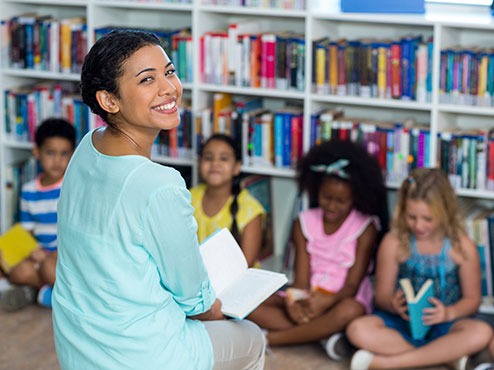Professional Development for Teachers and Educators
Learn and earn graduate credits for ACT 48 and continuing education
Better support your students by learning a new skill or deepening your knowledge in one of our graduate courses specifically designed for teachers and educators just like you. Courses are offered completely online in the Fall (Oct.-Dec.), Spring (Jan.-May) or Summer (May-July).
- Use what you learn immediately
- Earn 90 Act 48 credits with just one course
- Courses meet one night a week for eight weeks, completely online
Courses are open to any interested community member, educator or teacher. Once completed, the course can be applied toward a certificate or degree from Carlow University.

“These classes were so beneficial in expanding my instructional teaching practices! I took several of the classes and could immediately apply strategies and techniques in my classroom and with my students. The Carlow instructors are amazing and their experiences are relevant to today’s educational challenges. I had never written a grant proposal before and was nervous about taking the grant writing class. Patty Beaumont made the process so much fun and understandable; I wrote a full proposal for a student-centered initiative and submitted it to a Foundation for consideration. I am so happy that I decided to take these classes!”
— Erica Slobodnik, Second Grade Lead Teacher, Duquesne City School District
2024-25 Course Schedule
All courses meet one night a week for 8 weeks in an online format.
SUMMER
ED 610 Grantwriting for Educators (May 20 – July 18)
Instructor: Rachel Griffo | Tuesdays
This course covers education-related grant writing, focusing on researching and developing proposals that align with a school or organization’s mission. Participants will learn best practices in grant management and stewardship, culminating in a final project proposal.
READ 766 Children and the Media (June 16 – August 4)
Instructor: Shellie Grooms | Mondays
This course reviews research on young children’s media use, addressing debates over early tech skills and concerns about two-dimensional screen exposure affecting brain development. Learners will examine media’s social impact on children and review recommendations on media use from professional organizations.
READ 721 Dyslexia & Structured Literacy (May 21 – July 9)
Instructor: Val Piccini | Wednesdays
This course provides a historical and neurological perspective on dyslexia and language-based learning differences in literacy programs. Candidates will explore evidence-based methods endorsed by the National Reading Panel and International Dyslexia Association, along with assistive technology in literacy instruction.
2022-23 Course Schedule
All courses meet one night a week for 8 weeks in an online format.
FALL
LE 705 Nature and Needs of the Gifted (Oct. 24 – Dec. 16) Instructor: Ms. Casey Weiss, Asst. Principal at Hillel Academy of Pittsburgh Mondays, 6-8:45 p.m. | 90 Act 48 credits | $270
This course emphasizes the characteristics of the gifted student, various identification procedures, the needs of the student population, program models to meet those needs, and theories of intelligence.
LE 774 Building School Culture and Climate (Oct. 27 – Dec. 16) Instructor: Dr. Phillip Woods, Superintendent, Aliquippa School District Thursdays, 6-8:45 p.m. | 90 Act 48 credits | $270
This course is designed for future and current leaders seeking to develop or improve their work environment for all stakeholders. Beginning with an introduction to various leadership styles, students will identify the qualities and characteristics of leaders that affect positive culture and climate in the school/work environment including the importance of collaboration, delegation, and building self and staff efficacy. Students will study the importance of student/teacher relations and examine how Implicit Bias and Deficit Thinking Model greatly impact these relationships. As part of this course, students will examine the three tiers of Positive Behavior Interventions and Supports and alternatives to suspensions. Special emphasis will be placed on urban educational and workplace settings.
SPRING
ED 610 Grantwriting for Educators (Jan. 11 – March 3) Instructor: Ms. Patty Beaumont, Director, Special Grants & Research in Education at Carlow Wednesdays, 6-8:45 p.m. | 90 Act 48 credits | $270
This course examines various aspects of grant writing and proposal development, specifically education-related grants targeted for educators. The focus of this course is on researching and writing successful education grant proposals. This course emphasizes the various components of the grant writing process and the development of grant research and application skills for opportunities that align with the participant’s school or organization’s mission. Emphasis will be placed on an understanding and utilization of Best Practices in grant management/grant writing/grant stewardship and the successful planning of grants projects. All of these skills will culminate in a final proposal of a project idea.
ED 766 Children and the Media (March 15 – May 5) Instructor: Ms. Shellie Grooms, Senior Program Associate, Fred Rogers Institute Wednesdays, 6-8:45 p.m. | 90 Act 48 credits | $270
An overview of the research and educational policies regarding young children and the media. There is growing controversy over the role of media and technology in the lives of children. Some suggest that starting early to teach technology skills is important; others have grave concerns about the impact on early brain development when children experience extended viewing of objects in two-dimensional form, rather than exploration of three-dimensional objects. Additionally, there is ample evidence that television and video viewing affect the social behavior of young children, in either positive or negative ways, depending on the content of the programming. Learners will examine the controversies surrounding the effects of media (visual, auditory stimulation) and the recommendations of various professional organizations on the use of media and technology in programs for young children.
SUMMER
READ 721 Dyslexia & Structured Literacy (May 15 – July 7) Instructor: Ms. Val Piccini, Carlow Instructor, Reading Specialist and National LETRS Trainer Asynchronous Online | 90 Act 48 credits | $270
This graduate course is designed to provide the historical perspective of language-based learning differences and dyslexia in the content of literacy programs involving reading, writing, spelling and handwriting. Within this framework, the neurological basis of oral and written difficulties will be given particular emphasis. Candidates will examine the research of instructional evidence-based methods and practices in accordance with the National Reading Panel and International Dyslexia Association and the implementation of assistive technology in literacy instruction.
LE 784 Literacy Leadership (May 16 – July 7) Instructor: Dr. Rob Buffone, Principal at Franklin Regional Intermediate School Wednesdays, 6-8:45 p.m. | 90 Act 48 credits | $270
In this course, students will study the role of leadership in organizing and sustaining networked literacy learning communities aimed at cultivating an environment of continuous literacy improvement. Content will focus on evidenced-based practices that align to the Science of Reading. Students will examine and explore the theoretical models that underpin the instructional practices involved in explicit reading instruction and intervention at the district and school level. Students will examine instructional routines, techniques, and explicit lesson plans necessary to analyze current practices and improve literacy outcomes for all students and systems. Students will develop an understanding of assessments specific to reading and integration of literacy data into instruction to close achievement gaps. In evaluating theoretical models, instructional routines, and literacy assessment frameworks, the aim is to ensure literacy for all is achieved through systemic change in practices aligned to the Science of Reading.
AE 600 Art & Learning (May 15 – July 7) Instructor: Ms. Leigh Roche, Art Educator at The Campus Lab School Mondays, 6-8:45 p.m. | 90 Act 48 credits | $270
This course examines the relationship between art and human development — how engaging with works of art and learner-centered discovery-based inquiry activities develop SEL, creativity and imagination, multiliteracy, and aesthetic understanding. Students will deepen their understanding in Visual Thinking Strategies and Thinking Routines. Emphasis will be placed on creativity and the brain, imagination and aesthetic experiences, and will expand understanding of how the arts relate to social justice and affect human development. As part of this course, students will demonstrate how to create experiential learning in art that develops imagination and multi-modal learning.
Registration
If you are a Carlow student, you may register for your courses through Self-Service (login required).
Guest students or Carlow Alumn can register in four easy steps:
- Identify the courses you are interested in.
- Complete the Guest Student Registration Form [pdf]. You will need to input course information on this form.
- Submit the registration form with your unofficial transcripts to the Registrar’s Office by email: registrar@carlow.edu.
- You’ll receive an email from the Registrar’s Office that confirms your registration and provides you with the next steps to complete your registration.

Contact Us
We’re here to help you become the teacher or educator you want to be.
Course registration questions:
Email: registrar@carlow.edu
Phone: +1 (412) 578-6389
All other questions:
Email: ambisignani@carlow.edu